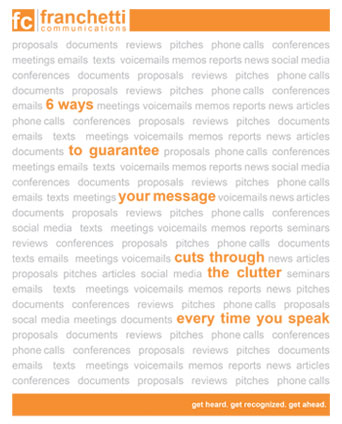
Too many people are shy about giving and requesting feedback. Unfortunately, the consequences for this can be significant.
We’ve asked thousands of executives from top companies worldwide, “What feedback have you received from your colleagues about your presentations?” The response is almost universally a dead stare. Or, feedback is typically limited to the proverbial pat on the back and a shout of “good job!” Yet, these same individuals will receive feedback on their 360s indicating that they need to work on their communication skills. It’s understandable then, that by the time they come to us they are feeling confused and even frustrated.
Feedback is often held back because no one wants to insult a colleague or offend the boss, especially when there’s fear that doing so could harm their chances of a future promotion. But giving feedback doesn’t need to be so stressful.
When done properly, providing constructive feedback can strengthen a team, boost morale, and have a positive impact on a company’s bottom line. Good performers equals better business.
It’s time to face this fear. Here are four ways to help:
- Following a meeting, pitch, or presentation, find an opportunity to give your peer the feedback s/he is secretly looking forIn a private setting (to prevent any potential embarrassment), offer a very specific point of feedback that is positive in nature. Follow the positive with a constructive and specific suggestion on one thing they could do differently. For example, you could tell your colleague, “You did a great job answering their rapid fire questions and staying cool under fire. When we give the presentation tomorrow, it might be stronger if you make a point to engage like that more with the audience, rather than looking up at the screen so much.”
- Make a pact with a colleague. Team up with a coworker and agree to provide each other with constructive feedbackIf they are going to see you speak at a meeting or important event, tell them, in advance, that you would love to hear their unbiased opinion. Offer to do the same the next time they will speak. The mutual nature of your agreement will make for a safe space in which to share your observations freely.
- Keep an open mindSometimes feedback can sting. But remember, if you don’t know what the problem is you can’t make any changes. Even if you disagree with the feedback you receive, thank your colleague for taking the time to assist, and try not to become defensive.
- Remember the Golden Rule: do unto others as you would have others do unto youIn other words, give feedback to others in the same way you hope to receive feedback. Set a good example.
Most importantly, when you do receive feedback, don’t take it personally! Focus on the improvements that you can make when you take the critiques at face value and remember, it is being given not to put you down, but to help lift you up.
Franchetti Communications delivers accelerated results by designing power-packed media interview and presentation training sessions around your unique goals, in person and via teleconference. Franchetti Communications works with corporations and business leaders to develop communication strategy, messaging, and PR strategy. Follow Franchetti Communications on LinkedIn, and be sure to download our special report: 6 Ways to Guarantee Your Message Cuts Through the Clutter.






Very good points! We are putting together a model at work to help associates on all levels to give each other feedback. It is a tough skill to master but with practice it can make your colleagues and yourself better. I like the 4 easy steps to remember.